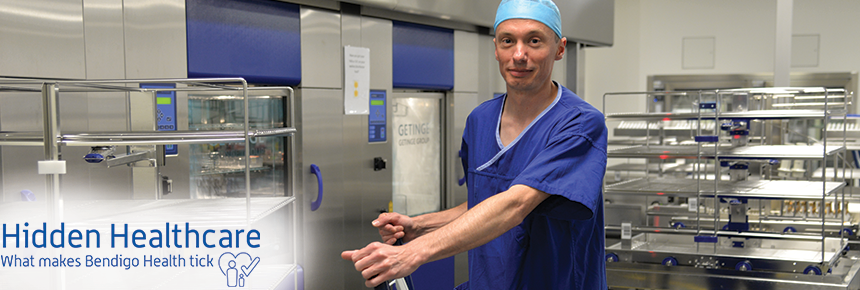 Darren Martin and the Central Sterilising Department team process around 285,000 piece of medical equipment each year.
Darren Martin and the Central Sterilising Department team process around 285,000 piece of medical equipment each year.
Darren Martin and his team rarely see the patients.
They’re not helping stitch up a wound, fixing a broken bone or removing tumours.
But staff in the Central Sterilising Department (CSD) – the ‘engine room’ of Bendigo Health – are an integral part of the operating theatre team.
As unit manager Darren explains, the job satisfaction of the CSD team comes from knowing the operating theatre, and the equipment used during surgery, is the safest it can be.
“We don’t know a person’s background, we don’t know if they have a blood borne virus or an infectious disease. We treat everything as though it is infected and process the equipment as if it was going to be used on ourselves or a loved one,” he said.
And it is quite a process.
Once it leaves the operating theatre, a piece of equipment can spend up to four hours being cleaned, disinfected, dried, sorted and then sterilised before its ready to be reused.
Around 40 staff are employed in the CSD. Last year they processed more than 285,000 pieces of medical equipment, all of which are electronically tagged and documented.
Despite the CSD team’s commitment, surgical site infections do occur, some of which can have disastrous consequences.
They can be caused by the environment in the operating theatre or from the patient’s normal flora.
“Instances you hear of where people have died from complications from routine surgery are a reminder that strict standards and best practice guidelines should always be followed,” he said.
“You always have that risk when you go into the operating theatre.”
More recent challenges for the CSD team include the rise in orthopaedic surgeries since the move to new hospital.
“Every manufacturer releases a new (knee, hip replacement) kit every couple of years which has its challenges because you need to know which part of the kit to take apart to clean it and process it correctly,” Darren said.
Darren became an instrument technician 18 years ago after witnessing the care a family member received during their battle with breast cancer.
“I suppose I wanted to give back to the health service,” he said.
“I’ve absolutely loved it and get so inspired being around these doctors, nurses and professional people doing the best job they can day in, day out.”

For more in our Hidden Healthcare series, click the link below.
Hidden Healthcare